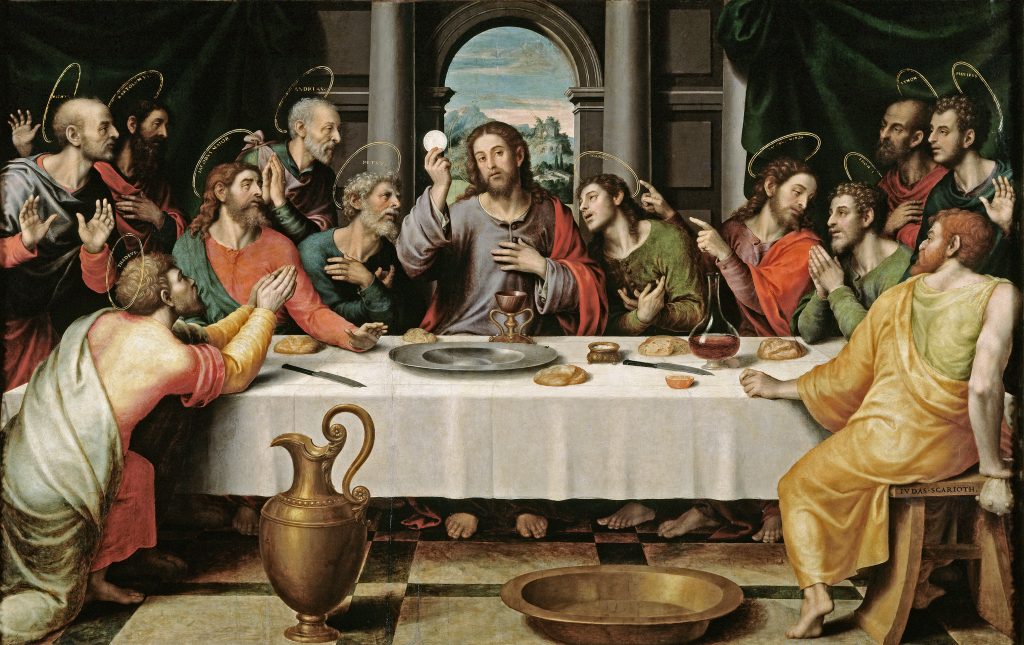
Lesson Objectives
- To learn the "big-picture" overview of the Bible - the story that the Bible tells.
- To understand the concept of "covenant" and its importance for reading and interpreting the Bible.
- To learn in general detail the six major covenants in the Bible.
V. Study Questions
1. According to Father Yves Congar, what is the "content and meaning" of Scripture?
2. What are the two major differences between covenants and contracts?
3. What is God doing through His covenants?
4. What are the six main covenants of the Bible?
5. What are the five features that need to be remembered about each of the biblical covenants?
6. What is the Greek word for universal? What does that word tell us about the Church that Jesus established?
For prayer and reflection:
Read and pray over the nine Scriptures and Responses that are traditionally read during the Easter Vigil Mass on Holy Saturday night. Ask God to help you understand how the liturgy envisions the promises of the Old Testament being fulfilled in the New Testament, using this prayer that's said during the Vigil after the reading of Genesis and the Psalm:
Lord God,
In the New Covenant
You shed light on the miracles you worked in ancient times:
The Red Sea is a symbol of our baptism,
and the nation you freed from slavery is a sign of your Christian people.
May every nation share the faith and privilege of Israel
and come to new birth in the Holy Spirit.
We ask this through Christ our Lord.
Amen.
The readings for the Easter Vigil are as follows:
1. Genesis 1:1-2:2
Response: Psalm 104:1-2,5-6,10-14,24,35
2. Genesis 22:1-18
Response: Psalm 16:5,8, 9-11
3. Exodus 14:15 -15:1
Response: Exodus 15:1-6,17-18
4. Isaiah 54:5-14
Response: Psalm 30:2-6,11-13
5. Isaiah 55:1-11
Response: Isaiah 12:2-3, 4, 5-6
6. Baruch 3:9-15, 3:32-4:4
Response: Psalm 19:8-10,17
7. Ezekiel 36:16-17, 18-28
Response: Psalm 42:3,5; 43:3-4
8. Romans 6:3-11
Response: Psalm 118:1-2, 16-17, 22-23
9. Matthew 28:1-10 (Year A) or Mark 16:1-7 (Year B) or Luke 24:1-12 (Year C)
Other Lessons
- Lesson Two: From Sabbath to Flood
- To read Genesis 1-12 with understanding.
- To learn the meaning of the first two covenants of salvation history - the Sabbath, and the covenant made with Noah.
- To begin to understand the "patterns" of biblical history.
- Lesson Three: Our Father, Abraham
- To read Genesis 12-50 with understanding.
- To understand God’s covenant with Abraham and to see how that covenant is fulfilled in the New Covenant of Jesus Christ.
- To appreciate key figures and elements in the Abraham story - Melchizedek, circumcision, the sacrifice of Isaac - as they are interpreted in the Church’s tradition.
- Lesson Four: The First-Born Son of God
- To read the Books of Exodus, Leviticus, Numbers, and Deuteronomy with understanding.
- To understand God’s covenant with Israel at Sinai and to see how this covenant looks forward to and is fulfilled in the New Covenant of Jesus Christ.
- To appreciate the key figures and events - Moses, the Passover, and the vocation of Israel as “a kingdom of priests” - as they are interpreted in the Church’s tradition.
- Lesson Five: A Throne For All Generations
- To finish reading the Old Testament (from Joshua to Malachi) and to read with understanding.
- To understand the broad outlines of the history of Israel in light of God’s covenant with Abraham.
- To appreciate the crucial importance of God’s everlasting covenant with David.
- Lesson Six: The New and Everlasting Covenant
- To read the New Testament with understanding.
- To understand how the New Testament depicts Jesus as the fulfillment of the covenants of the Old Testament.
- To appreciate, especially, the importance of God’s everlasting covenant with David for understanding the mission of Jesus and the Church as it is presented in the New Testament.